Tale of two countries: Bolivia is still very much in recovery mode post-Roya with ICO exportable production statistics still bumping along the lows of the last two decades, this coupled with a volatile internal market makes for difficult times for coffee farmers. Some in the farming community claim the government is focusing more on coca than coffee when they most need their assistance.
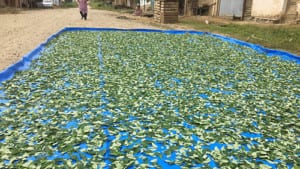
Coca leaf in the street, Taipiplaya, Bolivia
Despite this, there are a few glimmers of hope in top-end speciality but this is proving difficult to scale. With only a few notable exceptions, the collapse in yields in what’s always been a challenging co-op sector is being decimated by structural inefficiencies, debt and associated lack of pre-finance with several organisations shutting up shop. This is creating a worrying vacuum, time will tell what the dynamics will be here; exit from coffee or stronger multi-national presence but with potentially less value participation from farmers? All of this means that Bolivia is often shunned by the coffee community as just too difficult.
We however remain passionate about Bolivian coffee, anyone that’s travelled there and seen the real potential that exists in its topography and micro-climates we would share that with us. That’s probably why we’ve been working with ASOCAFE through thick and thin for the last 10-years. Located around Taipiplaya which is close to Bolivia’s coffee capital Caranavi, we hope to shortly start a climate change and certification project following our visit, we’ll update more on this in the months to come.
ASOCAFE have been working hard post Roya, renovating farms and inspiring the next generation of coffee farmers with their unique school project. Here three schools in the area have their own coffee farms enabling school age children to better appreciate what is the lifeblood of their community and wider environmental issues.
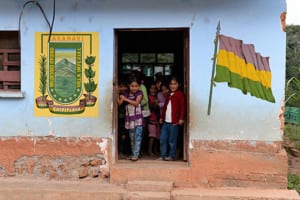
Primary School, Taipiplaya, Bolivia
Meanwhile in Peru, we are seeing production yields now exceed pre-Roya levels at our partner San Juan del Oro through training and their hard work on the ground to renovate farms; all this amidst a difficult backdrop in the Sandia valley region – again coca production and urban migration taking their toll. We bought our first Peruvian micro-lot in this area back in 2007 and it’s historically produced some of the best cupping coffee in the Peru, so it’s good to see quality is on the up as well.
Also, fantastic to witness on the ground knowledge sharing as we visited Pangoa with San Juan del Oro for a project workshop (funded by one of our customers). This is typical of what’s always been in the main a collaborative co-op environment in Peru.
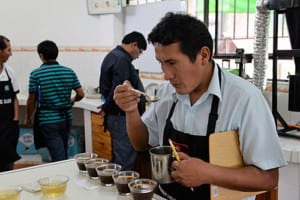
Collaboration: San Juan del Oro Cupping with Pangoa, Pangoa, Peru
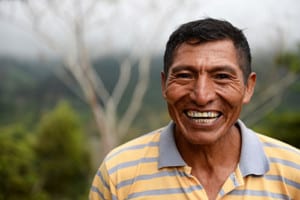
Marcela Ramos Perez, Fincha Palestina, Pangoa, Peru
Pangoa’s approach to gender equity of course continues to inspire and great to see their farm improvements being household led now alongside their female producer led coffee and diversification initiatives.
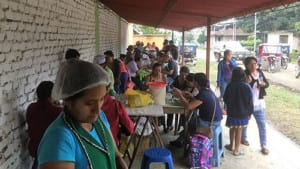
Pangoa Co-op women’s committee street market, Pangoa, Peru
In the North of Peru, we celebrated 10-years of partnership with Sol y Café; here it’s about organisational innovation to retain and grow the strong farmer base. Quality processes backed by innovative IT solutions are key to this in terms of rewarding farmers based on moisture, defects, certification level and cup score.
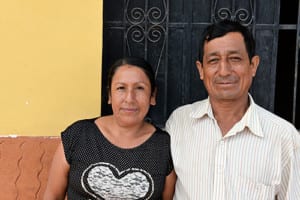
Husband and wife, Rosa Chinguel Niera (L) and Andrea Guevara Ruiz (R), Sol y Café members, La Coipa, Jaen, Peru
One of the founder members of Sol y Café, Andreas has been expanding his award winning farm and renovating his existing plot to help improve output and quality.
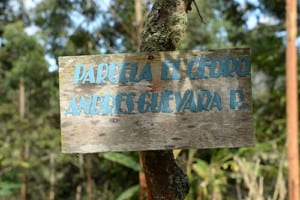
Andreas Guevara Ruiz’s farm Parcela El Cedro, Sol y Café members, La Coipa, Jaen, Peru
In doing so he’s extending his family’s six-decade legacy of coffee farming here in La Coipa and building a sustainable farm for his children. In terms of true sustainability and a future for coffee, all of this is attracting a new generation of young farming families who see a viable living in coffee.
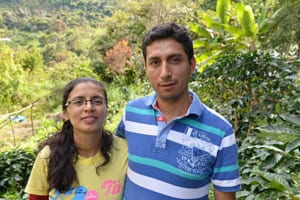
Husband and wife, Yenire Bocanegro (L) and Manuel Elera (R), Sol y Café members, San Jose de Alto, Jaen, Peru
